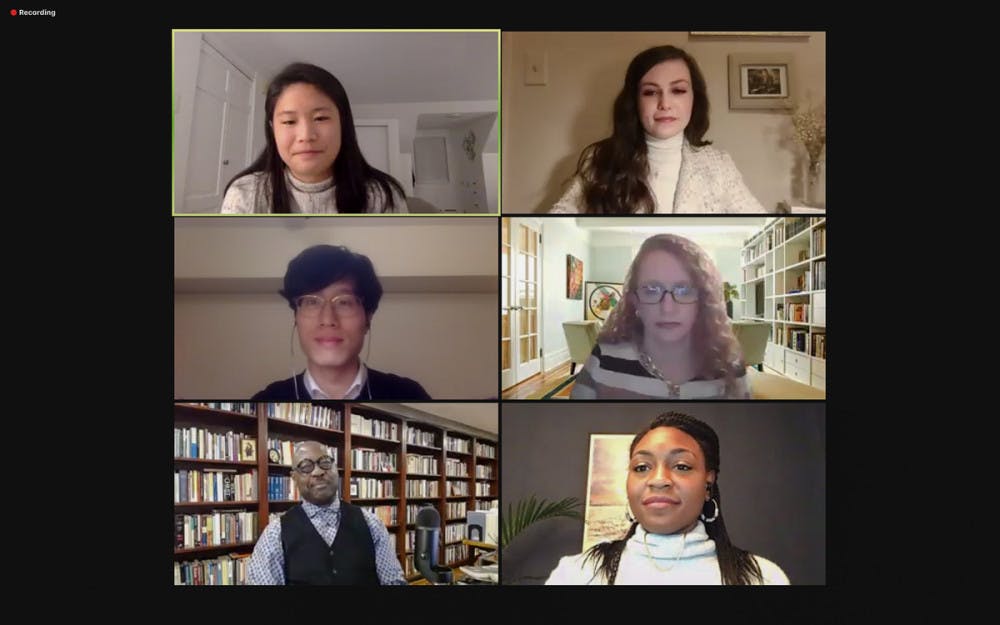In a world where hostility is rewarded with attention and controversy becomes viral within moments, how do we hold space for the opposing opinion? What does it mean for one to be “cancelled”? Can we forgive mistakes made in public?
These are just a few of the many questions raised Thursday at the Veritas Forum panel discussion on the topic "Cancelled: Is Public Transgression Redeemable?" organized by Harvard, Northeastern and Duke University, and co-sponsored by Brown.
The panel featured Christine Emba, an op-ed columnist and editor at the Washington Post, Suzanne Nossel, CEO of PEN America, and Willie Jennings, a professor at Yale Divinity School and an ordained Baptist minister.
The Forum aims to “pursue truth” by asking pertinent questions and putting the “Christian faith in dialogue with other beliefs,” according to their website. The panel discussed the definition of cancel culture, its impact and the possibility of forgiveness during the age of social media.
Nossel and Emba discussed the “elasticity” of the term “cancel culture” and the ambiguity caused by the lack of a fixed definition of who is considered “cancelled.” “Are they experiencing consequences for an action? Or are they being removed from discussion for no good reason?” Emba asked.
Nossel echoed Emba by bringing up former President Donald Trump’s attorney's suggestion that holding Trump accountable for the Capitol insurrection was a way of cancelling the former president. “I think the term is being manipulated,” Nossel said.
Emba worried that focusing on cancel culture could potentially obscure the primary issues. “If we have a debate about cancel culture, where somebody uses the N word in an article … if we continue talking about cancel culture without defining it, we're avoiding, and in fact, refusing to talk about the real problem, which is the N word.”
The understanding of cancel culture also raised questions about free speech and its consequences.
Free speech “is not meant to be a smokescreen for bigotry, you're not supposed to shout fire in a crowded theatre,” Emba said. “There is supposed to be a reason for you to be speaking.”
Speech can have “grievous,” psychological, academic and even physiological consequences, Nossel added. She highlighted that those who defend free speech tend to “downplay” those potential repercussions.
Emba also discusssed the reach of harmful speech in the digital age. “The hottest takes, the angriest shouts, the meanest tweets often get the most attention,” Emba said, calling Twitter a “disaster website.”
Nossel said the structure of social media platforms favors controversy and rewards impassioned responses. “When the winds start to whip up online, it becomes so ferocious that there's no oxygen for discussion,” Nossel said. “The apology often comes almost too quickly, because it's an emergency.”
Jennings talked about the potential risk of cancel culture to dismiss important levels of thinking and discussion. “What do we do when someone has spoken in ways that have been harmful, and they recognize it? … Now that's a problem because we live in a country that doesn't know how to enact redemption,” Jennings said.
He stressed the difference between forgiving, excusing and denying justice. Saying “I forgive you,” does not mean forgetting history, Jennings said, but instead, it represents a new reality of the relationship. He added that although there is not a way for people to take back their words, through forgiveness there is a “possibility of life after the wrong.”
Nossel also noted the value in forgiveness and said she opposes the “absolutist feelings” in cancel culture that insist no apology will make a difference. “It's not to say that (forgiveness) should be granted automatically or ignored even right away,” Nossel said. “But I think we need to hold open that space of those examples and talk about how our effective apology can be rendered.”
“Forgiveness is in many ways,” Jennings said, “a vocation, a duty, a calling to forgive not because we take injustice lightly, but because we take it very seriously.”

ADVERTISEMENT




